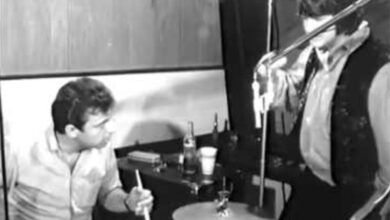Priscilla Says This Is The Song Elvis Sings With His Full Emotions
Elvis Presley, often referred to as the “King of Rock and Roll,” needs little introduction. Born on January 8, 1935, in Tupelo, Mississippi, Presley rose to fame in the mid-1950s with his groundbreaking blend of rockabilly, blues, and gospel music. His charismatic stage presence, electrifying performances, and unmistakable voice quickly catapulted him to superstardom, earning him a legion of devoted fans around the world.
The 1968 Comeback Special marked a pivotal moment in Presley’s career. After several years focused on movie roles and soundtrack albums, he returned to the stage with a renewed sense of purpose and passion. It was during this televised special that he delivered his iconic performance of “If I Can Dream,” a song that would come to symbolize hope and unity during a turbulent period in American history.
Written by Walter Earl Brown, “If I Can Dream” was penned specifically for Presley’s Comeback Special. The song’s powerful lyrics resonated deeply with both Presley and his audience, reflecting the social and political unrest of the late 1960s. Against the backdrop of civil rights struggles, anti-war protests, and cultural divides, Presley’s rendition of “If I Can Dream” offered a message of optimism and reconciliation.
In the performance, Presley’s commanding presence is palpable from the moment he takes the stage. Dressed in all black, he exudes a sense of gravitas and determination as he delivers the song’s stirring lyrics with conviction. Backed by a full orchestra and a gospel choir, his vocals soar with emotion, conveying both the pain of the present and the hope for a brighter future.
The orchestral arrangement adds depth and richness to the performance, while the choir’s harmonies provide a transcendent backdrop to Presley’s impassioned delivery. Together, they create a musical tapestry that is as powerful as it is poignant, capturing the spirit of resilience and unity that defined the era.
Beyond its musical excellence, Presley’s performance of “If I Can Dream” holds significant cultural significance. At a time when America was deeply divided along racial, political, and social lines, Presley used his platform to advocate for unity and understanding. His impassioned rendition of the song served as a rallying cry for hope and solidarity, resonating with audiences of all backgrounds.
Today, Presley’s performance of “If I Can Dream” remains a poignant reminder of the transformative power of music and the enduring legacy of one of the greatest performers of all time. His ability to transcend boundaries and connect with audiences on a deeply emotional level continues to inspire generations of musicians and fans alike, cementing his status as a cultural icon.





